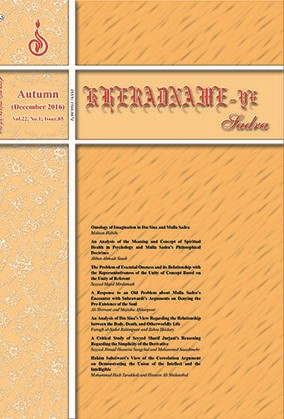-
-
List of Articles
-
Open Access Article
1 - Cheif Editor's Note
Seyyed Mohammad Khamenei -
Open Access Article
2 - Ontology of Imagination in Ibn Sina and Mulla Sadra
Mohsen Habibi -
Open Access Article
3 - An Analysis of the Meaning and Concept of Spiritual Health in Psychology and Mulla Sadra’s Philosophical Doctrines
Abbas Ahmadi Saadi -
Open Access Article
4 - The Problem of Essential Oneness and its Relationship with the Representativeness of the Unity of Concept Based on the Unity of Referent
Seyyed Majid Mirdamadi -
Open Access Article
5 - A Response to an Old Problem about Mulla Sadra’s Encounter with Suhrawardi’s Arguments on Denying the Pre-Existence of the Soul
Ali Shirvani Mojtaba Afsharpour -
Open Access Article
6 - An Analysis of Ibn Sina’s View Regarding the Relationship between the Body, Death, and Otherworldly Life
Furugh al-Sadat Rahimpoor Zahra Heidary Heidary -
Open Access Article
7 - A Critical Study of Seyyed Sharif Jurjani’s Reasoning Regarding the Simplicity of the Derivative
Seyyed Ahmad Hosseini Sangchal Mohammad Saeedimehr -
Open Access Article
8 - Hakim Sabziwari’s View of the Correlation Argument on Demonstrating the Union of the Intellect and the Intelligible
Mohammad Hadi Tavakkoli Hussein Ali Shidanshid
-
The rights to this website are owned by the Raimag Press Management System.
Copyright © 2017-2026







